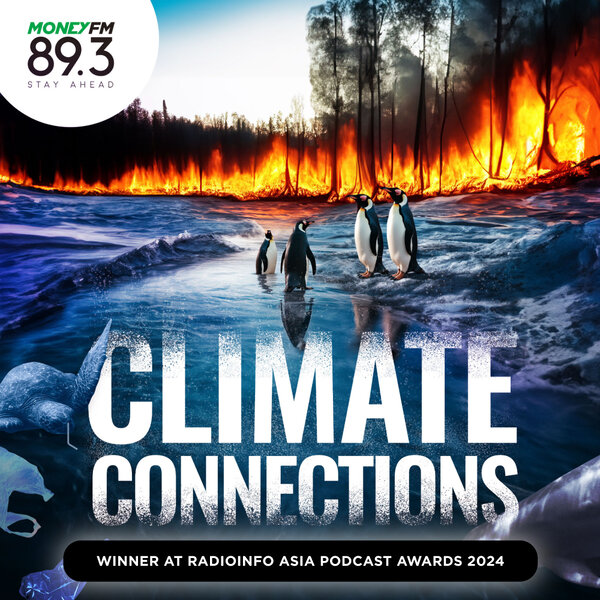
Climate Connections
About
A special segment on Money FM 89.3's Breakfast Show that brings you on an exclusive audio journey to the ends of the world, covering in-depth environment, natural history and climate change stories that intertwine with human life on Earth.
MAR 28, 2025
28/03/25 - Climate Connections: Why do the pH levels of the early oceans matter? And what does it tell us about Earth’s evolving habitability in the broader context of climate change?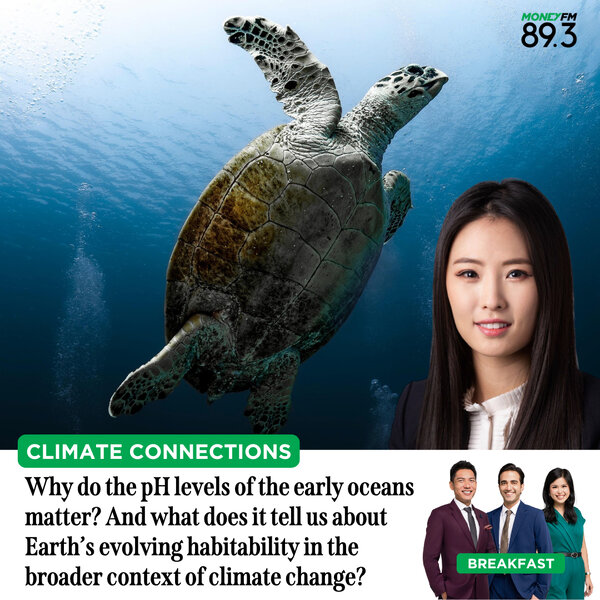
A new study has found that ocean acidity may have prevented life on Earth from developing for the planet's first 500 million years.
On this episode of Climate Connections, its study lead, Dr Guo Meng from the Asian School of the Environment at NTU weighs in on how ocean pH has evolved from our early days and the research by her team of scientists, on developing the most comprehensive Earth system model to date that is shedding new light on the critical role of ocean pH levels in the emergence of early life.
Her efforts so far, have given scientists a new perspective on when Earth likely became a habitable place some 4 billion years ago.
Feature produced and edited by: Yeo Kai Ting (ykaiting@sph.com.sg)
Voiced by: Emaad Akhtar
Photo credits: University of Richmond; AP/Richard Drew
Music credits: pixabay & its talented community of contributors
|
|
|
|
13:01
|
MAR 14, 2025
14/03/25 - Climate Connections: Climate change is creating that perfect rat storm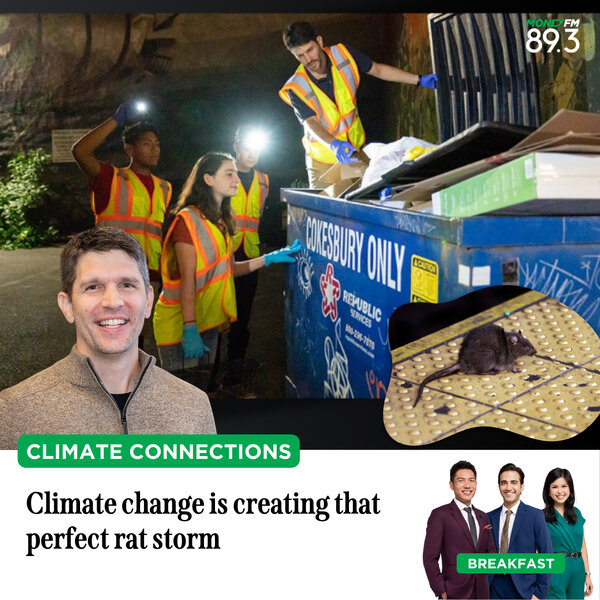
Over the years, scientists have linked climate change to rising sea levels, extreme weather and melting polar ice caps.
But as the mercury rises, urban rat populations too are increasing.
In the first research of its kind, scientists found that 11 of 16 cities studied had significant increasing trends in rat numbers, including Washington DC, New York, and Amsterdam. While the new study sheds light on the forces that may influence urban rat populations, cities remain highly complex environments.
On this episode of Climate Connections, Dr Jonathan Richardson, Assistant Professor of Biology at the University of Richmond, who led the research, shares his insights.
Feature produced and edited by: Yeo Kai Ting (ykaiting@sph.com.sg)
Voiced by: Audrey Siek
Photo credits: University of Richmond; AP/Richard Drew
Music credits: pixabay & its talented community of contributors
|
|
|
|
16:53
|
FEB 28, 2025
28/02/25 - Climate Connections: Top things to know about mycorrhizal fungi and why they are "climate warriors"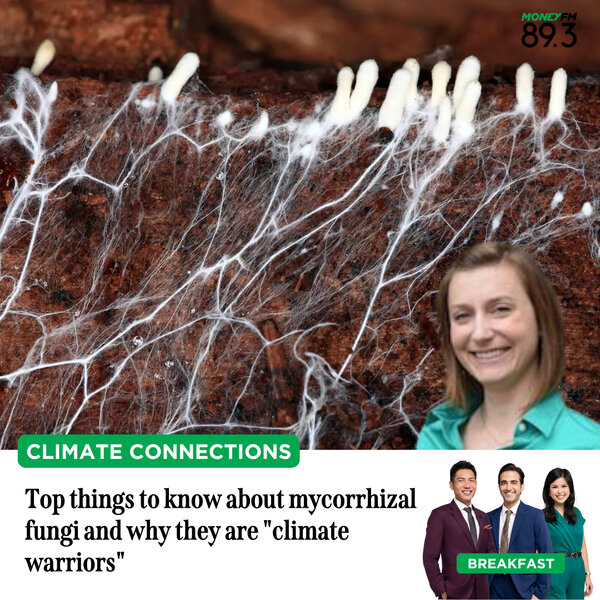
Fungi represent an entire kingdom of life on Earth. In fact, millions of species of fungi share our space on this planet. And since soil contains more than three times as much carbon as the atmosphere, what fungi do in the soil could dramatically affect climate change.
One group of fungi in particular - the mycorrhizal fungi - are quietly, but surely, doing us a huge climate favour behind-the-scenes, or in their case, underground. These fungi help forests absorb CO2 pollution, which can in turn contribute to delaying the effects of climate change.
But, how has the effects of climate change impacted mycorrhizal fungi and can such fungi be restored in degraded parts of forests and cities?
On this episode of Climate Connections, Jennifer Bhatnagar, Associate Professor of Biology at Boston University, who has been studying fungi, shares her insights.
Feature produced and edited by: Yeo Kai Ting (ykaiting@sph.com.sg)
Voiced by: Emaad Akhtar
Photo credits: CID Bio-Science
Music credits: pixabay & its talented community of contributors
|
|
|
|
14:44
|
FEB 14, 2025
14/02/25 - Climate Connections: How are climate change & human activities affecting soil quality & vice versa?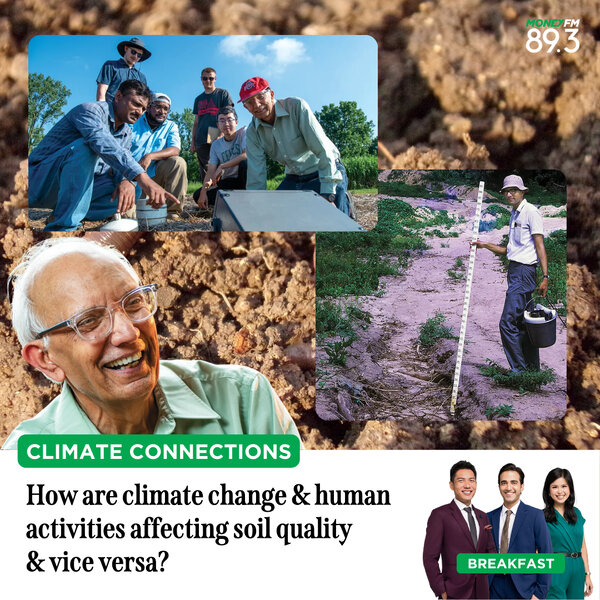
The soil beneath our feet is often forgotten and sometimes thought to be limitless and indestructible. But in fact, soil is key to feeding people, and in preserving the planet we live in.
However, data by the Food and Agricultural Organisation shows that over 33% of soils worldwide are already degraded, and if nothing is done to preserve it, a shocking 90% of the world’s soil will be degraded by 2050.
On this episode of Climate Connections, Rattan Lal, Distinguished University Professor of Soil Science, The Ohio State University - shares the secrets of the humble soil, which he dedicated over five decades to study, and what can be done to conserve and restore this precious resource.
Feature produced and edited by: Yeo Kai Ting (ykaiting@sph.com.sg)
Voiced by: Audrey Siek
Photo credits: Ohio State Alumni Magazine, Rattan Lal
Music credits: pixabay & its talented community of contributors
|
|
|
|
19:40
|
JAN 24, 2025
24/01/25 - Climate Connections: How can we protect what we don't know? A deep dive into why new species discoveries are so crucial.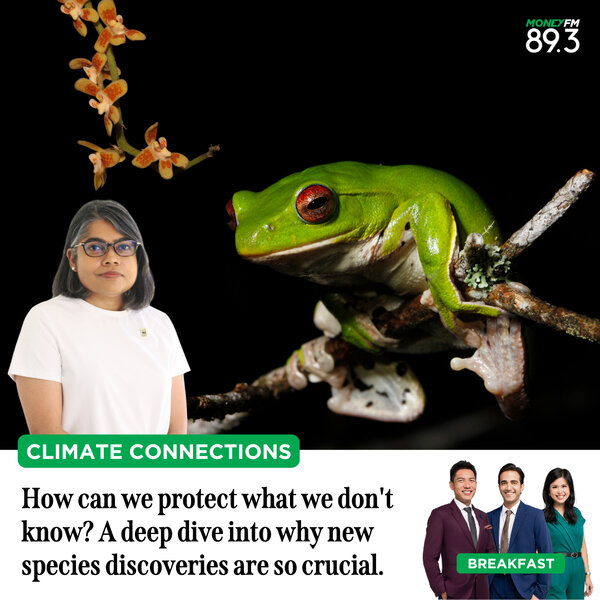
Species all over the world are declining at harrowing rates - driven by a mix of factors such as climate change and other human activities. But, there’s a bright light on the horizon.
WWF's latest report reveals that 234 new species were discovered by scientists in the Greater Mekong region back in 2023, including 173 species of vascular plants, 26 reptiles, 17 amphibians, 15 fishes and three mammals.
On this episode of Climate Connections, Uma Sachidhanandam, Director of Conservation & Science, WWF-Singapore explains what such discoveries mean for the Mekong region, how they’re named thereafter, and why the means through which some of these species are found reveal a more sinister plight. She also shares which three are her personal favourites!
Feature produced and edited by: Yeo Kai Ting (ykaiting@sph.com.sg)
Voiced by: Emaad Akhtar
Photo credits: WWF-Singapore, Truong Ba Vuong, Parinya Pawangkhanant
Music credits: pixabay & its talented community of contributors
|
|
|
|
18:29
|
JAN 10, 2025
10/01/25 - Climate Connections: Why is executing the High Seas Treaty to ensure sustainable fishing so challenging?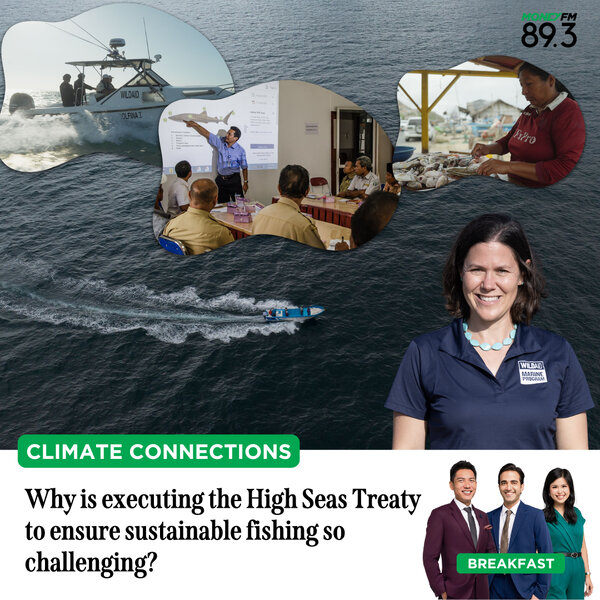
To protect our planet - meeting the global ‘30 by 30’ target of safeguarding 30% of oceans by 2030 is crucial. But that will not be possible without effective enforcement of Marine Protected Areas (MPAs).
Illegal, unreported and unregulated fishing - or IUU fishing - accounts for one of every five wild-caught fish. In fact, experts estimate that between 10 to 26 million tons of IUU-caught fish is taken out of our oceans each year, which equates to nearly 20 percent of the global reported catch.
This is contributing to the decline of certain species, which affects not just small-scale fishers, who make up 90% of the world's fishing workforce, but also jeopardises the survival of other marine species that depend on these fish species.
It has since been close to two years since the historic High Seas Treaty was signed in New York, a treaty that would allow the establishment of MPAs and other conservation efforts on the high seas - ocean areas that exist outside national borders and have previously never had a legal mechanism to cover them.
Yet, many countries struggle to make these protections a reality, even with the establishment of the High Seas Treaty.
On this episode of Climate Connections, Meaghan Brosnan, CEO of WildAid- a global non-profit organisation that is scaling marine enforcement to end illegal fishing and strengthen ocean conservation - shares her perspectives.
Feature produced and edited by: Yeo Kai Ting (ykaiting@sph.com.sg)
Voiced by: Audrey Siek
Photo credits: The Earthshot Prize
Music credits: pixabay & its talented community of contributors
|
|
|
|
09:57
|
JAN 3, 2025
03/01/25 - Climate Connections: Solomon Islands' First Female Rangers Break Barriers To Help Save Leatherback Turtles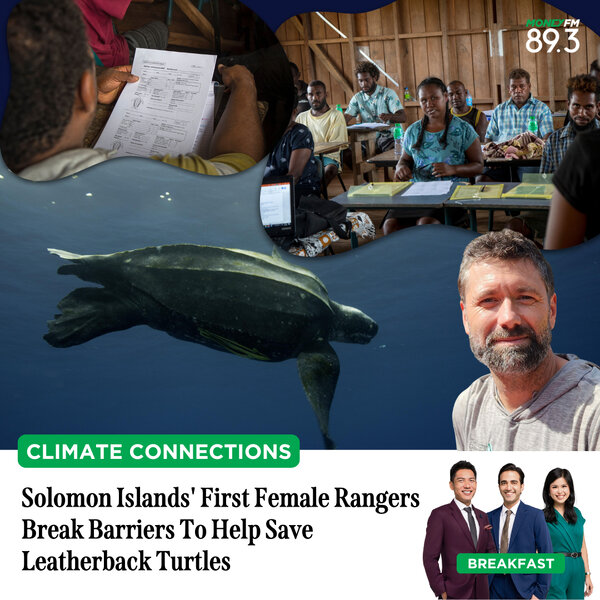
Leatherback sea turtles are classified by the IUCN as Vulnerable on a global level, but their subpopulation in the Western Pacific are faring far worse than others. According to scientists, that population has declined to just 1,400 breeding adults, leaving them critically endangered.
At the forefront of those efforts is The Nature Conservancy, which is partnering with the Solomon Islands government to gather data from critical nesting beaches in Isabel Province, with funding from the US National Oceanic and Atmospheric Administration (NOAA).
And although strict gender roles dictate much of Melanesian culture, TNC is slowly shifting the tides at Solomon Islands through the recruitment of women rangers.
On this episode of Climate Connections, Pete Waldie, Solomon Islands Program Director of The Nature Conservancy shares his first-hand insights.
Feature produced and edited by: Yeo Kai Ting (ykaiting@sph.com.sg)
Voiced by: Emaad Akhtar
Photo credits: The Nature Conservancy
Music credits: pixabay & its talented community of contributors
|
|
|
|
13:32
|
DEC 27, 2024
27/12/24 - Climate Connections: From Roots To Reef - Breathing new life into mangrove ecosystems in Lombok, Indonesia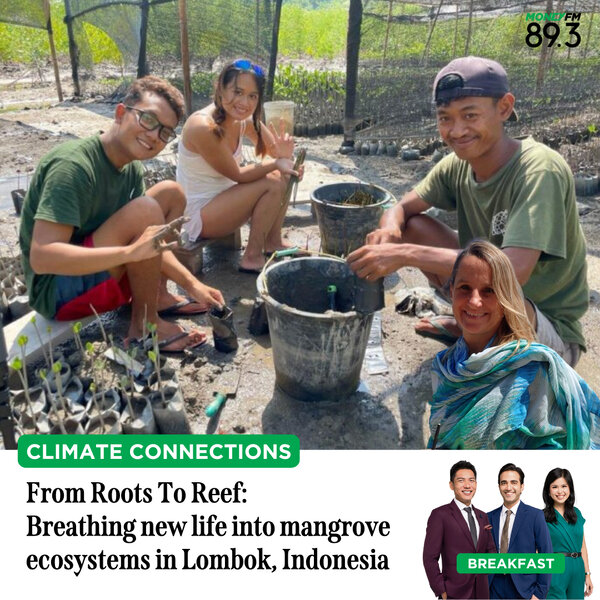
Over the last three decades, deforestation has led to a 40% reduction in forest cover in Indonesia.
Mangroves, one of the most essential ecosystems for coastal communities, have taken the fall in particular, with excessive logging activities reducing the seawater-tolerant species along coastlines. Scientists say, the consequences of that could be dire as mangroves provide shelter, food and improve water nutrient levels for marine life.
On this episode of Climate Connections, Dr Gretchen Coffman, Wetland Restoration Ecologist & Senior Lecturer, NUS, who is leading community-based restoration and research efforts within the mangrove ecosystems around Lombok, Indonesia, shares her insights.
Feature produced and edited by: Yeo Kai Ting (ykaiting@sph.com.sg)
Voiced by: Audrey Siek
Photo credits: NUS
Music credits: pixabay & its talented community of contributors
|
|
|
|
14:03
|
DEC 20, 2024
20/12/24 - Climate Connections: Mission Blue - "Her Deepness" Dr Sylvia Earle's Lifelong Quest To Turn The Tides For Our Blue Planet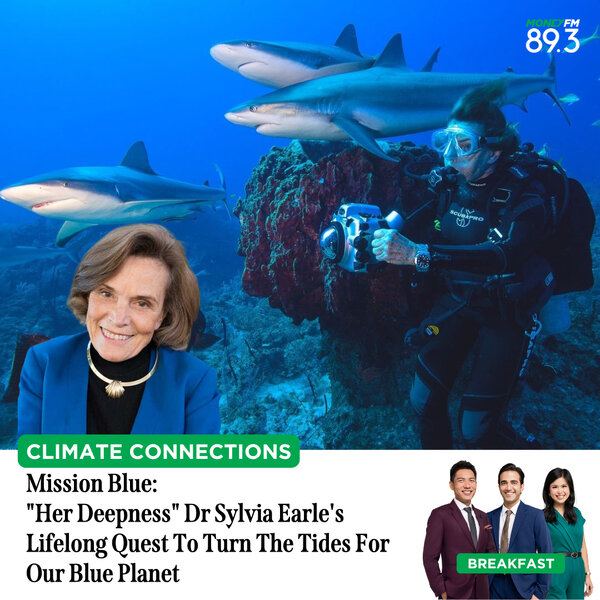
The ocean holds clues to past civilisations and cultures, provides a rich resource for new medicines and treatments, but more importantly, is home to millions of undiscovered species. Ocean scientists around the world have been seeking to unlock its secrets, but only just over 20% of the ocean floor is mapped. What lives, feeds and breeds down there in the icy depths remains a huge mystery.
Large-scale extraction of ocean species like cod, herring, tuna, swordfish and halibut, has brought the collapse of these wild populations by about 90% in just the last few decades.
But, a new wave of understanding about why the ocean matters is bringing a glimmer of hope.
On this episode of Climate Connections, Dr Sylvia Earle, Founder of Mission Blue & National Geographic Society Explorer in Residence - who has dedicated her life to explore, study and protect the oceans - shares first-hand insights on her dives into the deep blue and why exploration is an important step in educating the masses.
She also dives into what she’s hoping to achieve when she leads Ocean Geographic’s BIG ACE Expedition to ground-zero of the climate crisis: the Arctic, in line with her 90th birthday next year (2025).
Special thanks to Ocean Geographic.
Feature produced and edited by: Yeo Kai Ting (ykaiting@sph.com.sg)
Voiced by: Emaad Akhtar
Photo credits: Michael Aw / Ocean Geographic
Music credits: pixabay & its talented community of contributors
|
|
|
|
17:37
|
DEC 13, 2024
13/12/24 - Climate Connections: Are you underconsuming what you have?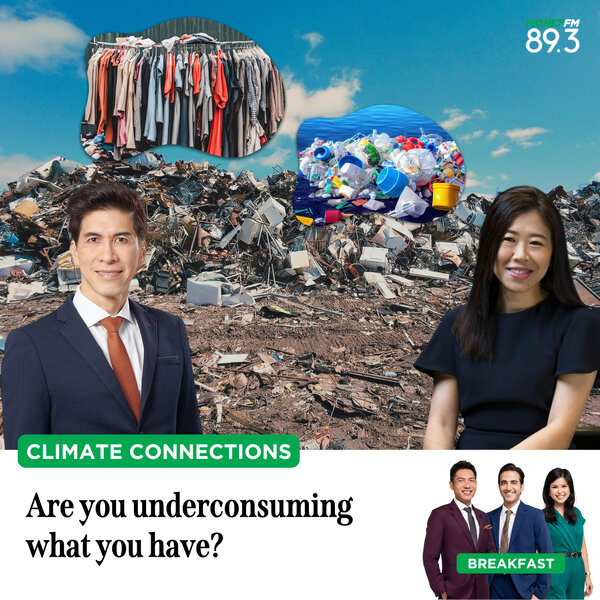
Do you use your things for what they are worth before throwing it out?
With a lot more focus placed on fighting the effects of climate change, the pace at which we’re using our planet’s resources has also come into the spotlight. According to the World Economic Forum, high-income countries use about six times more materials per capita and are responsible for 10 times more climate impacts per capita than low-income countries.
So, how can overconsumption be curbed more effectively? And are you underconsuming what you have?
On this episode of Climate Connections, Cheang Kok Chung, Executive Director, Singapore Environment Council and Michelle Lee, Associate Professor of Marketing (Education), Lee Kong Chian School of Business, Singapore Management University weigh in on how attitudes towards consumption are changing, and what consumers and businesses can do to play their part.
Feature produced and edited by: Yeo Kai Ting (ykaiting@sph.com.sg)
Voiced by: Emaad Akhtar
Photo credits: Earth.com, pixabay & its talented community of contributors
Music credits: pixabay & its talented community of contributors
|
|
|
|
13:07
|







